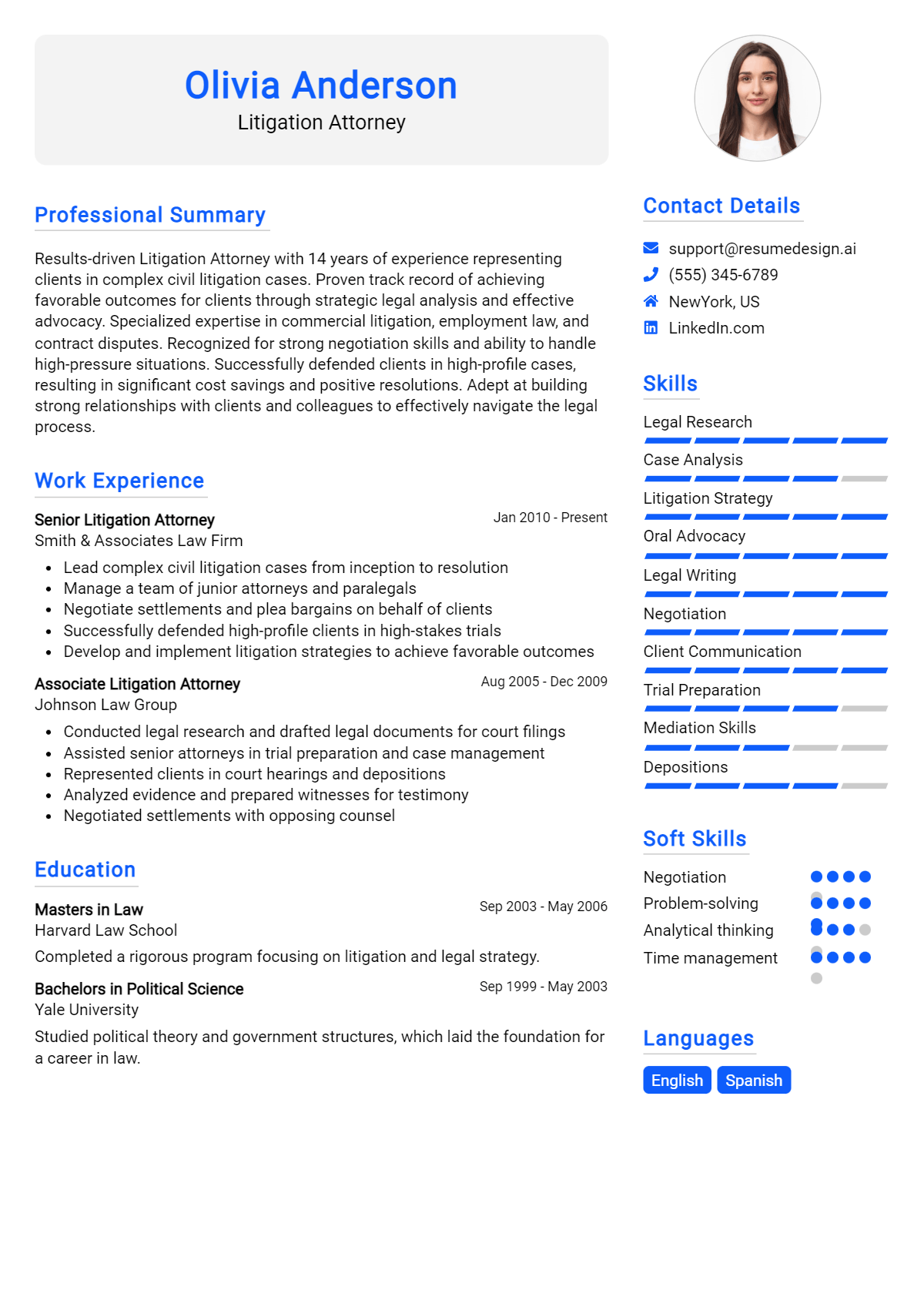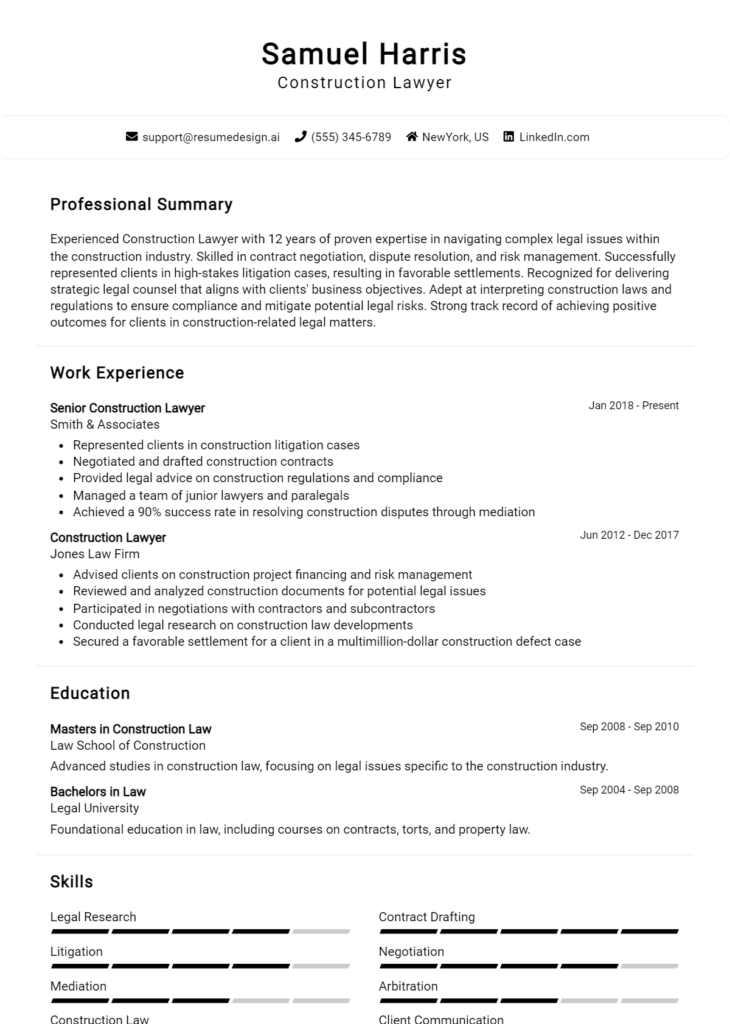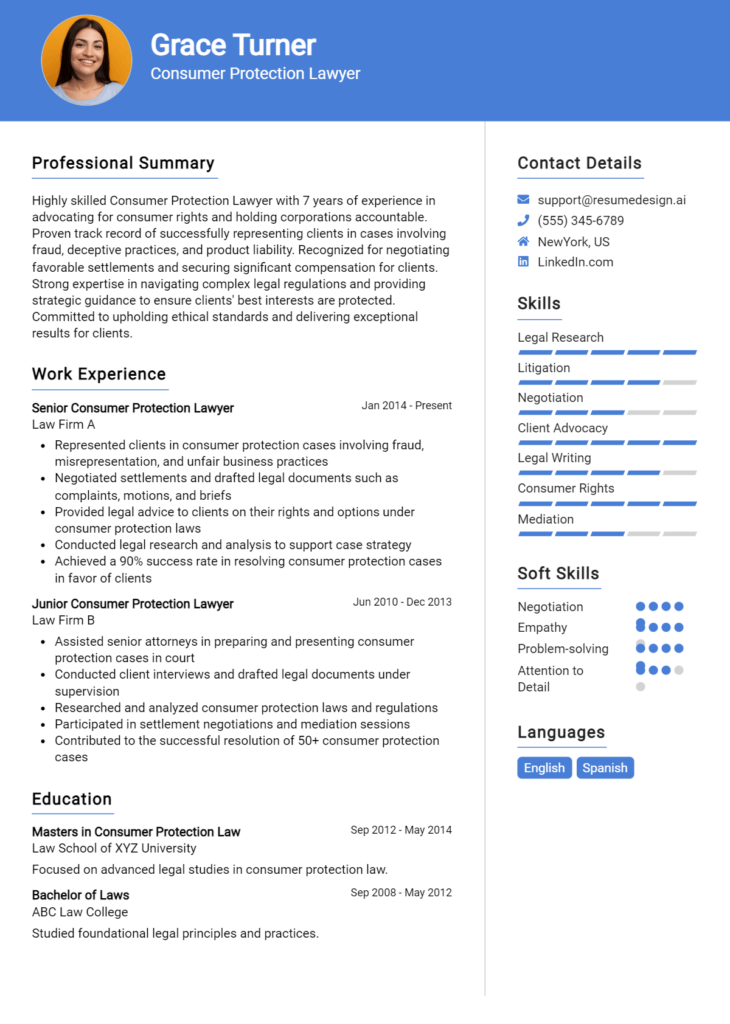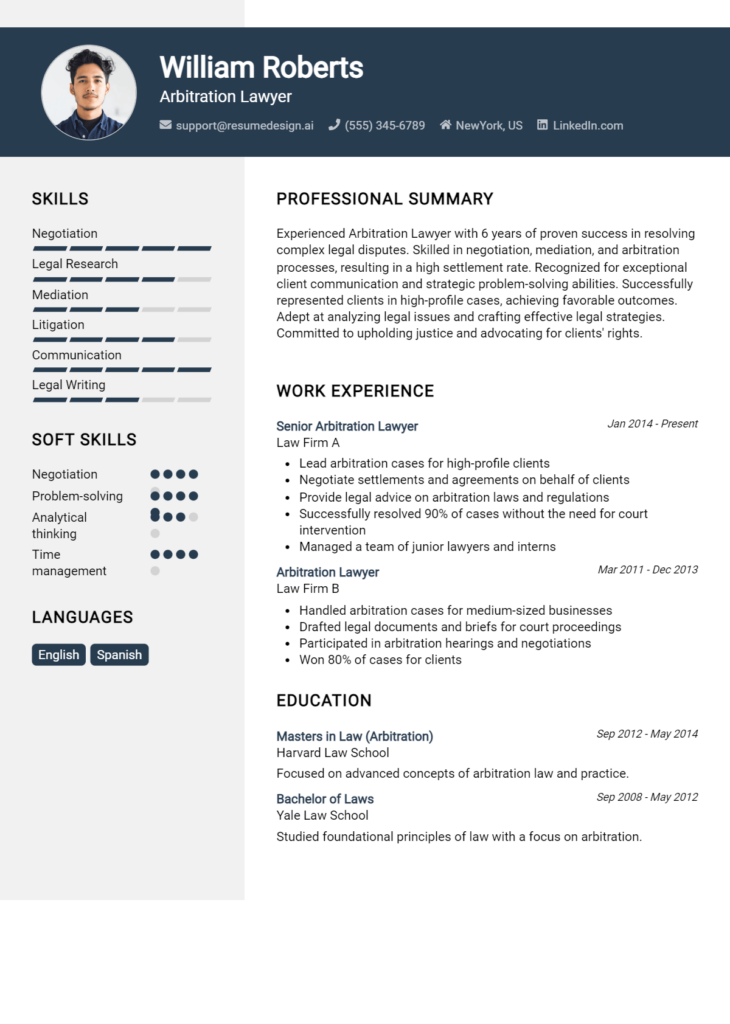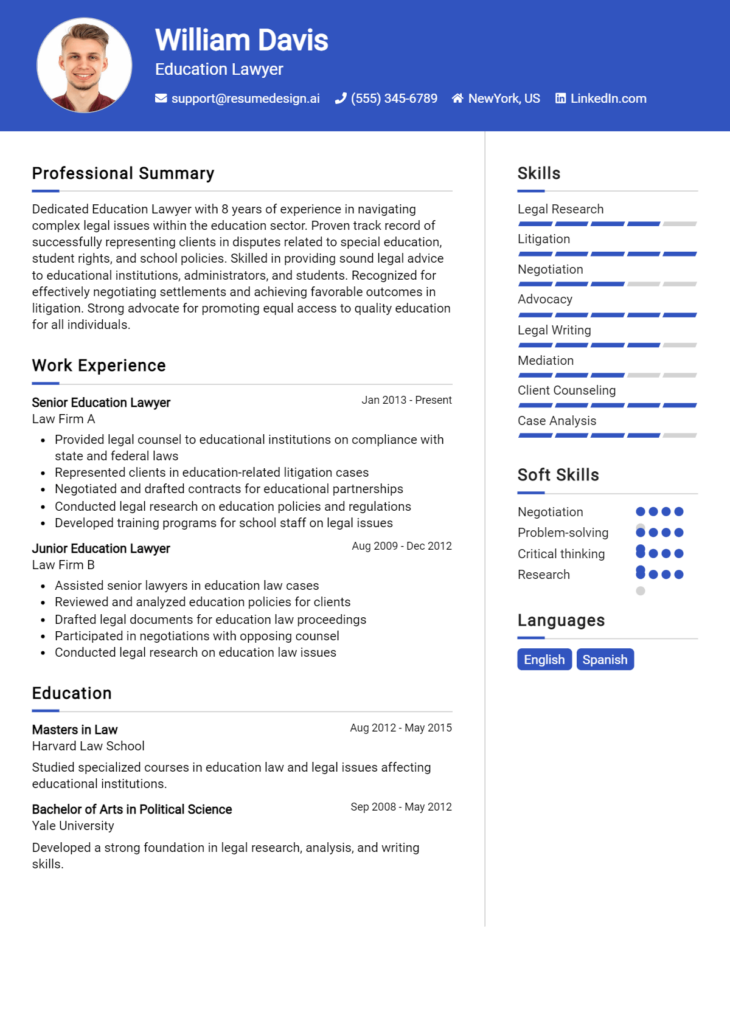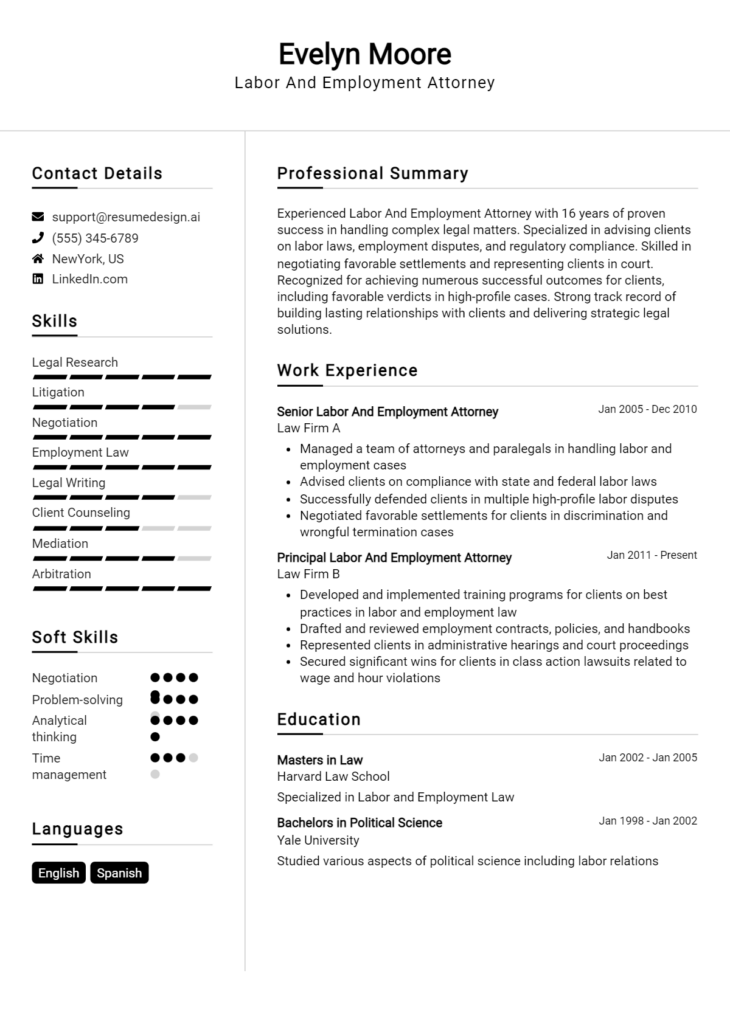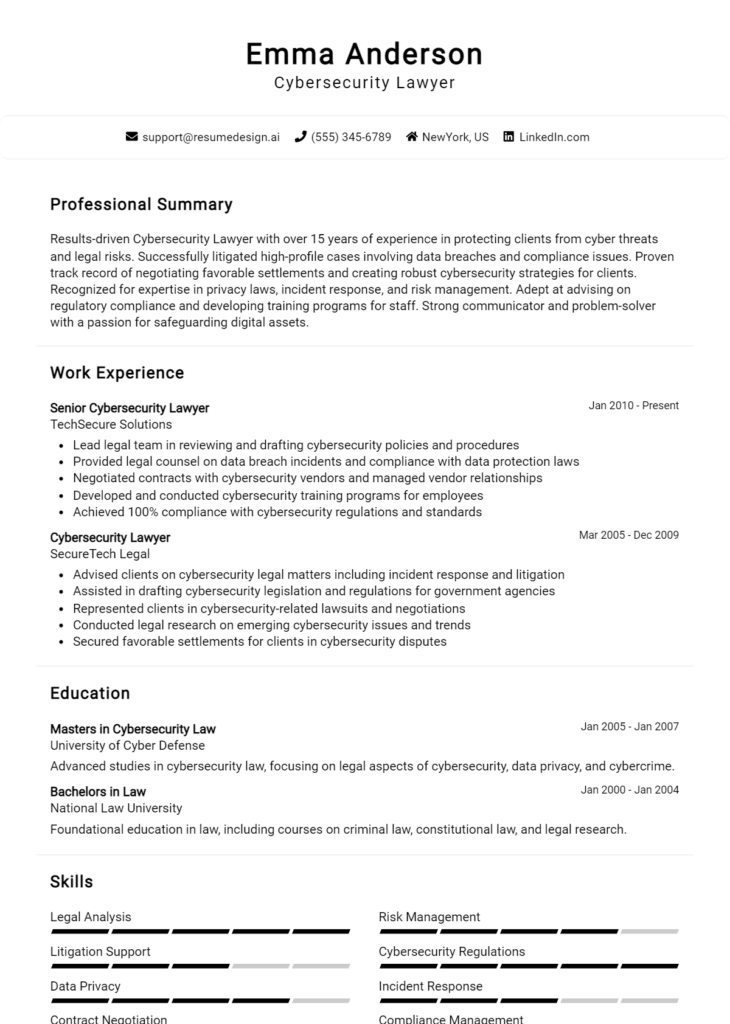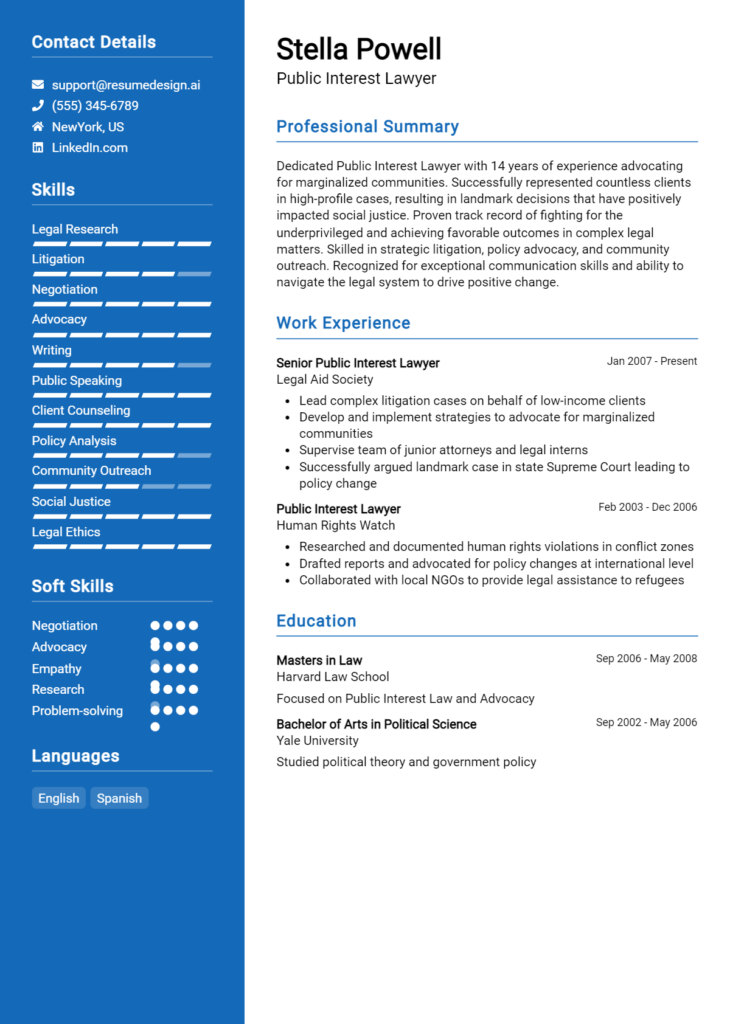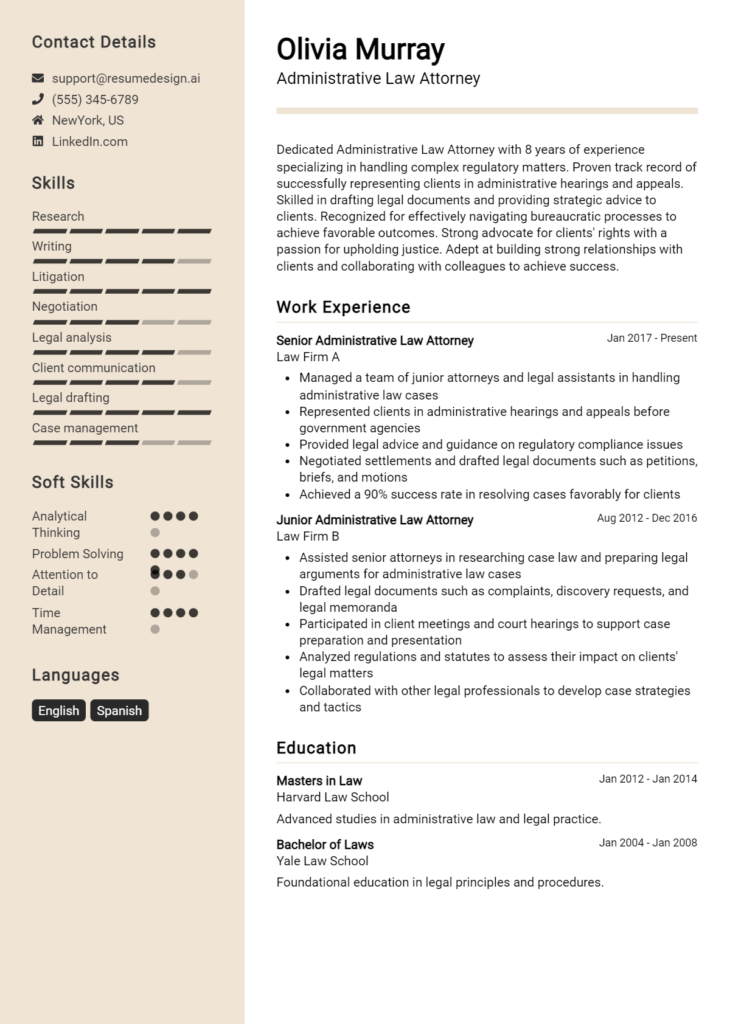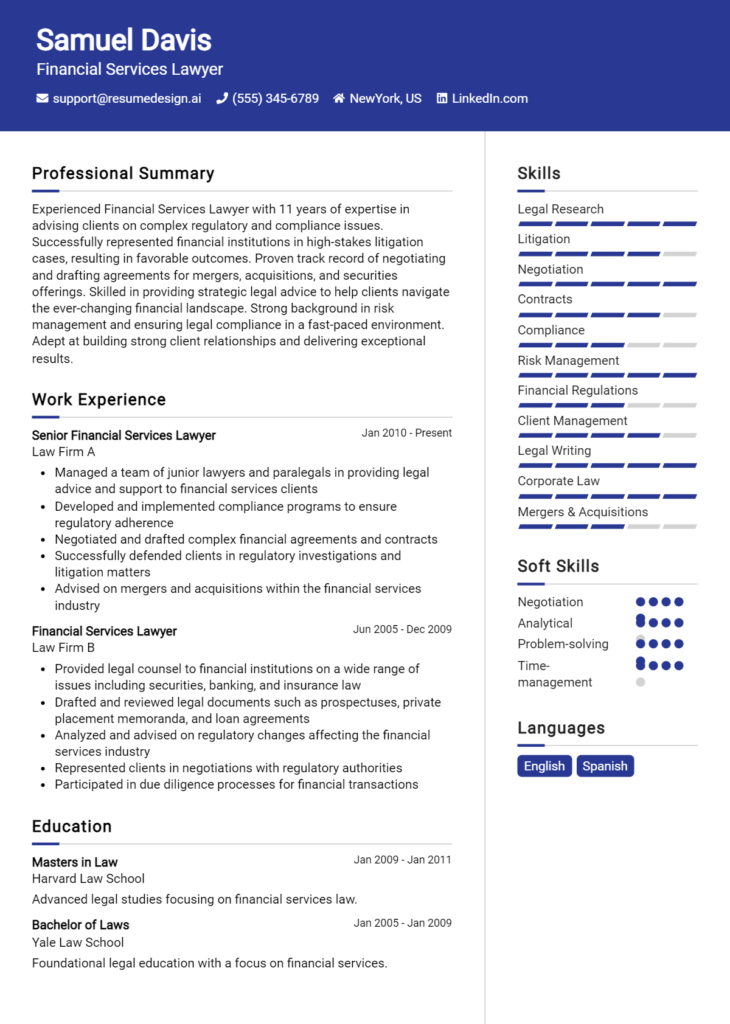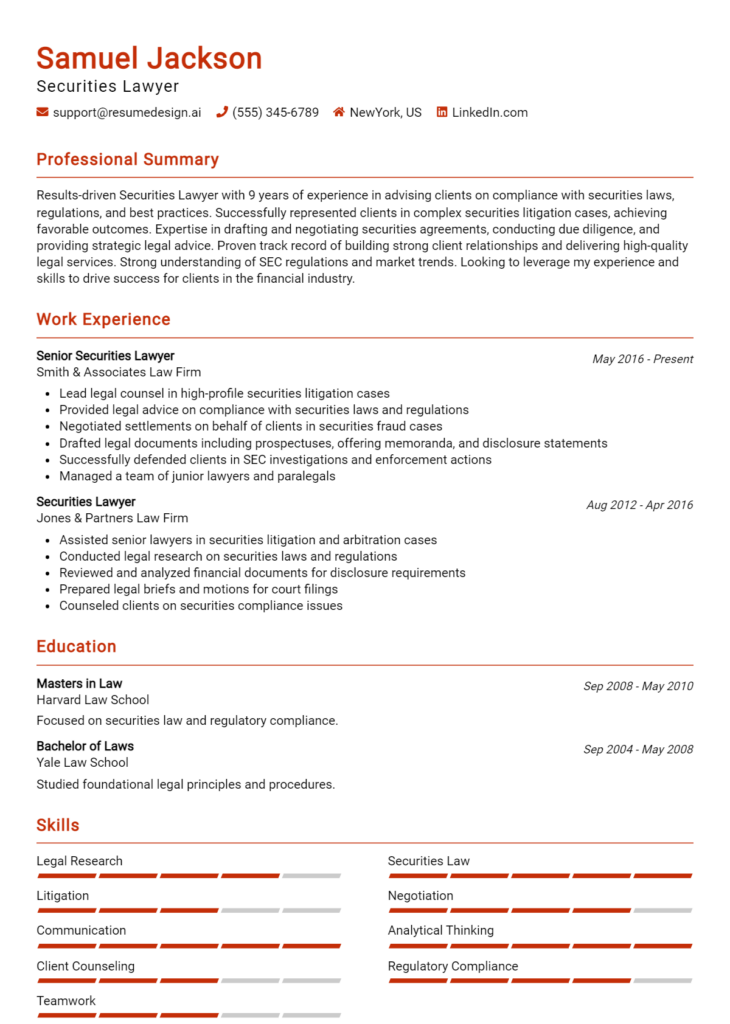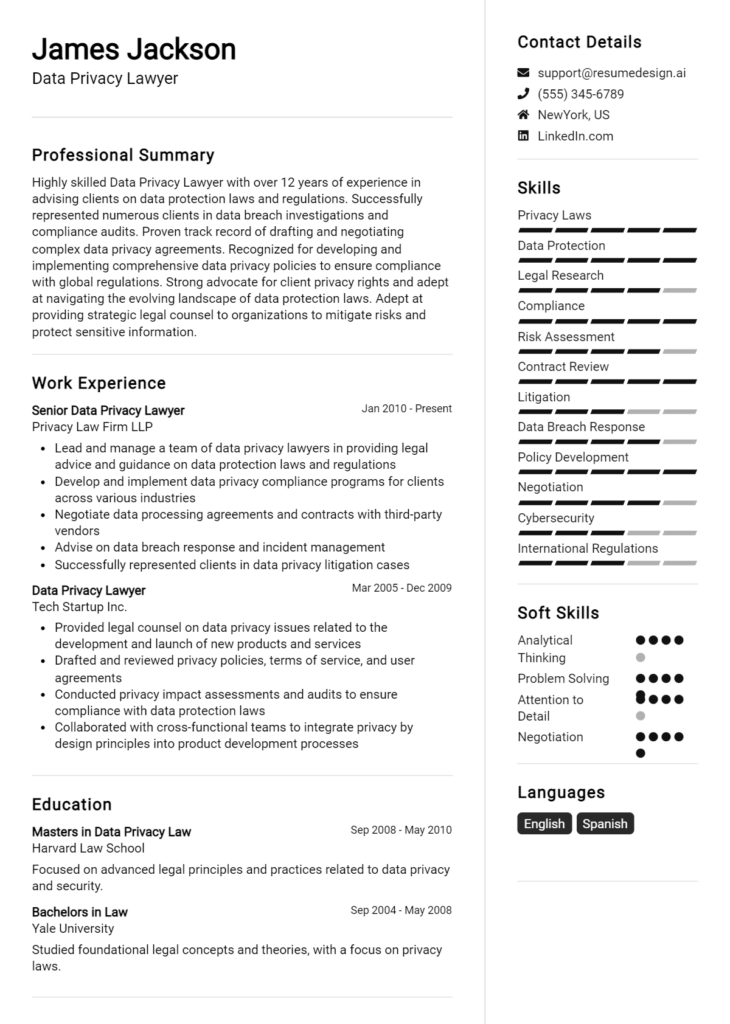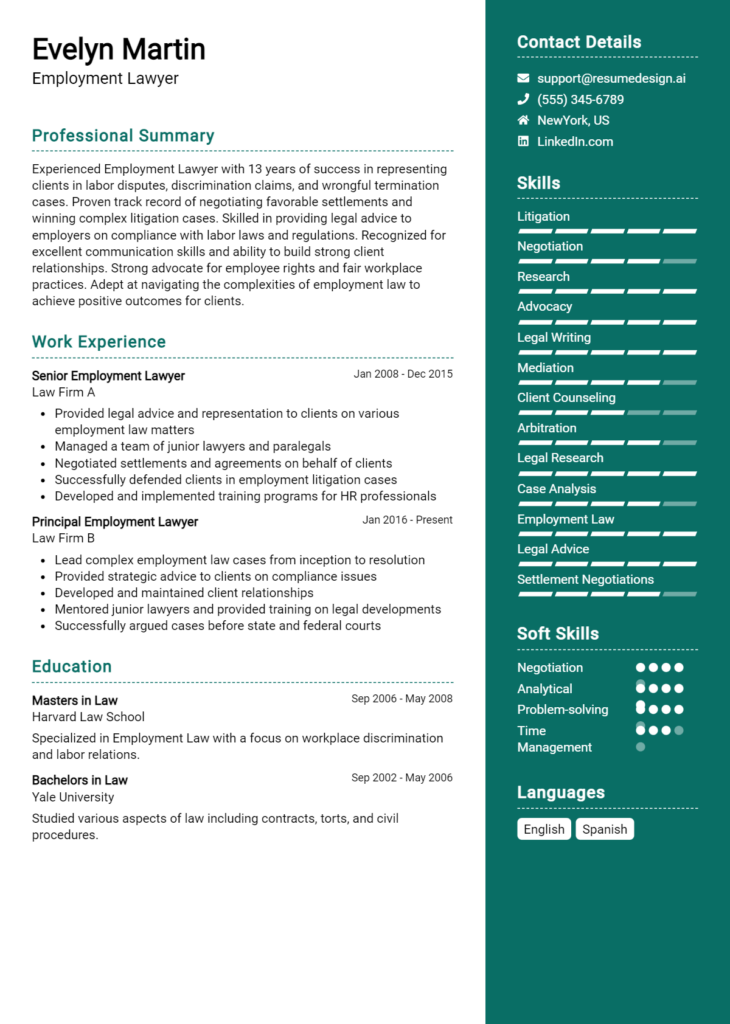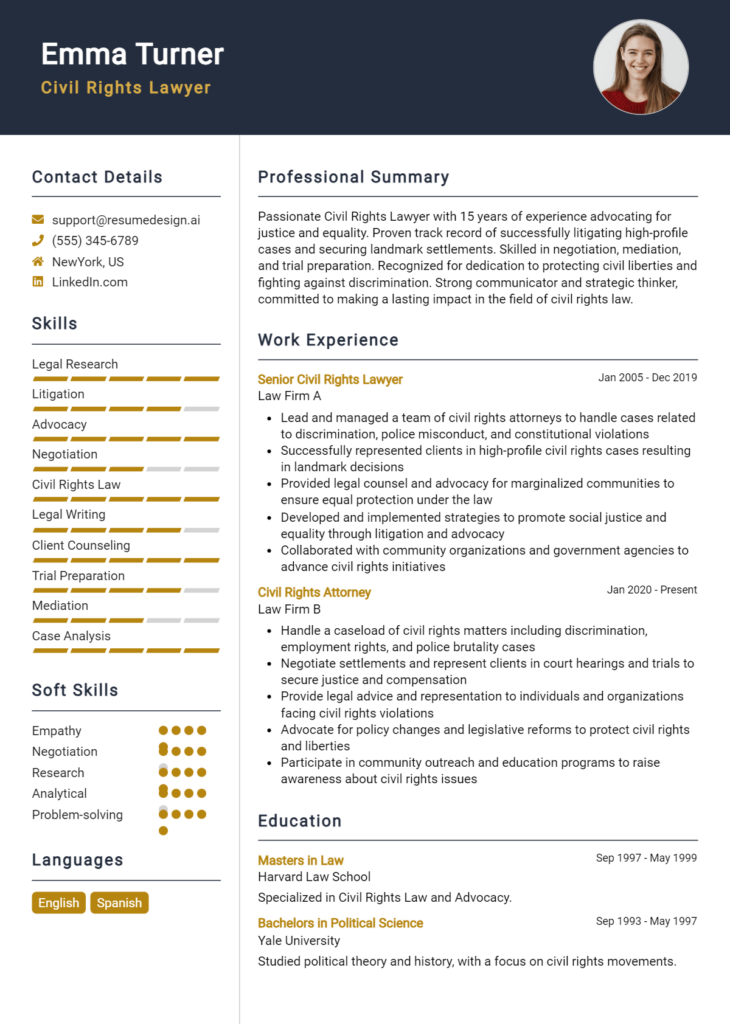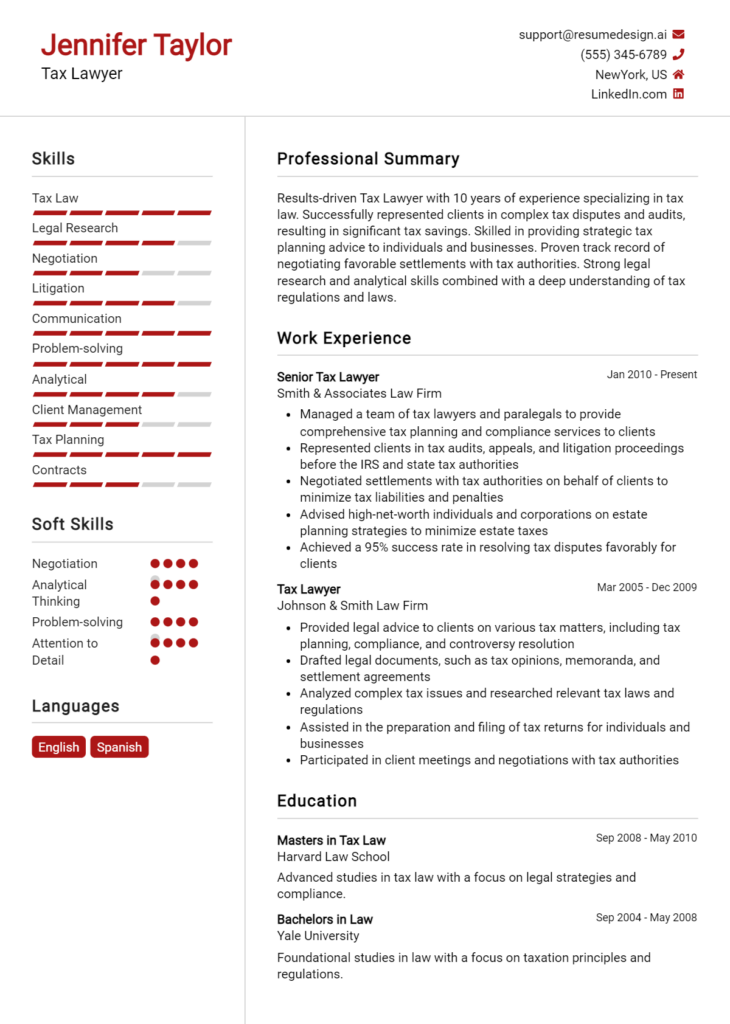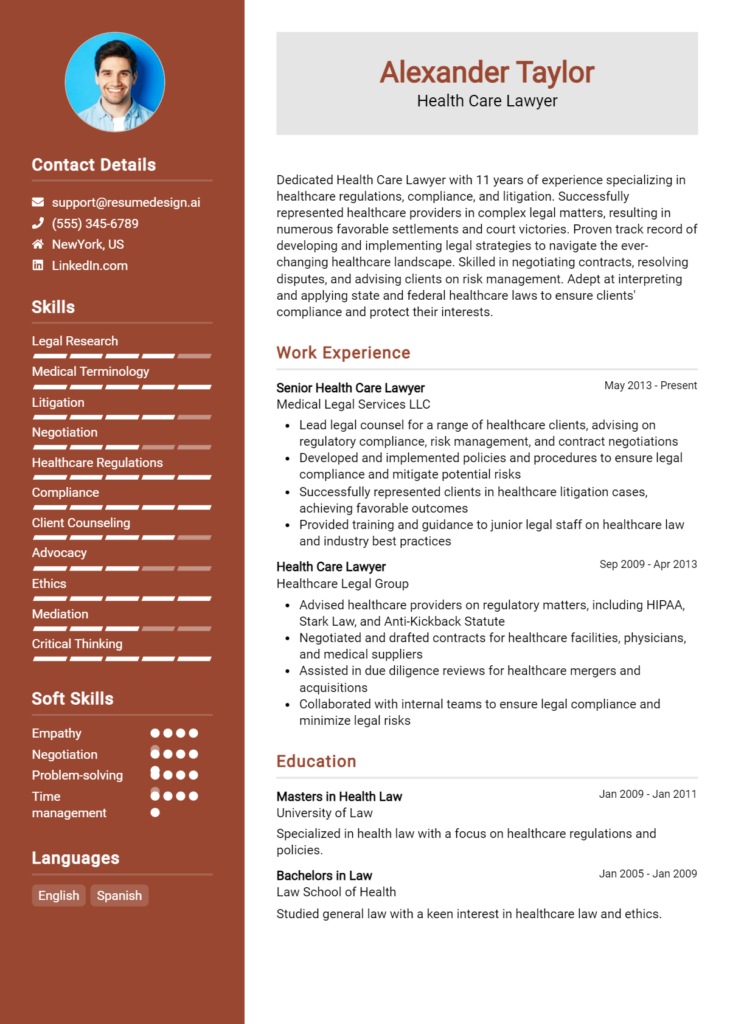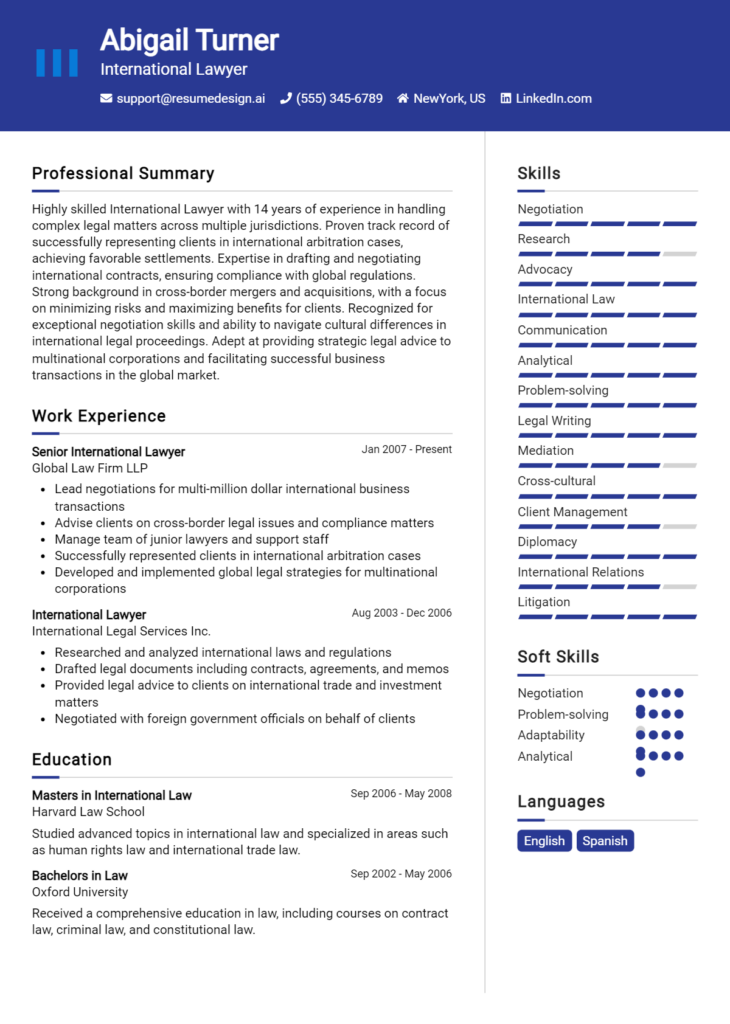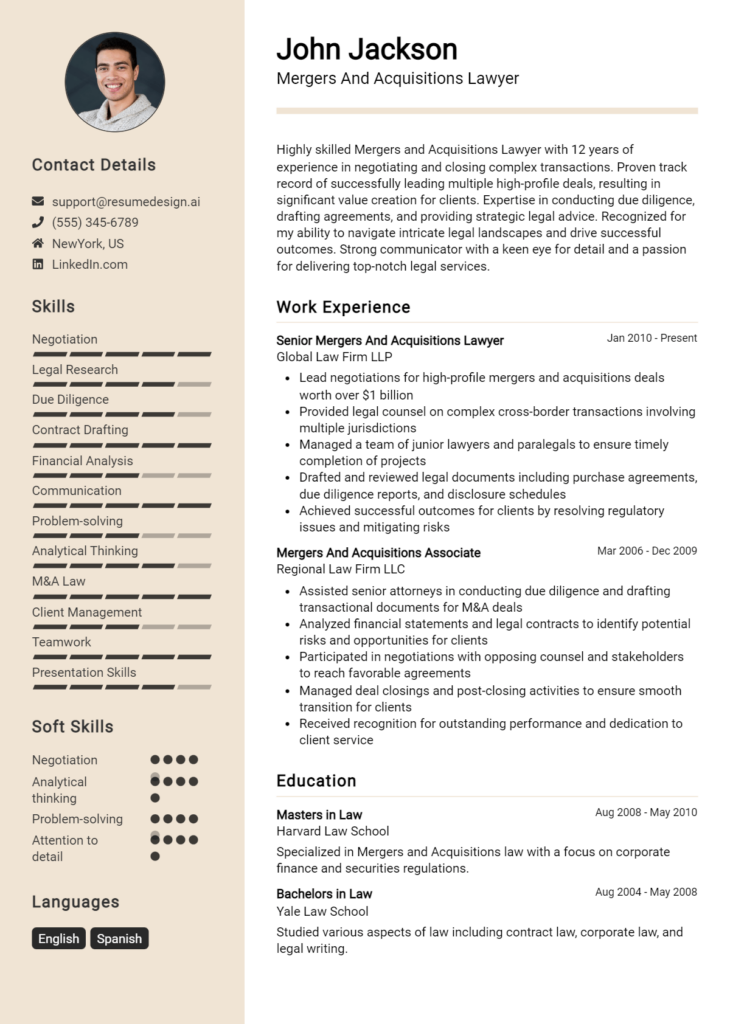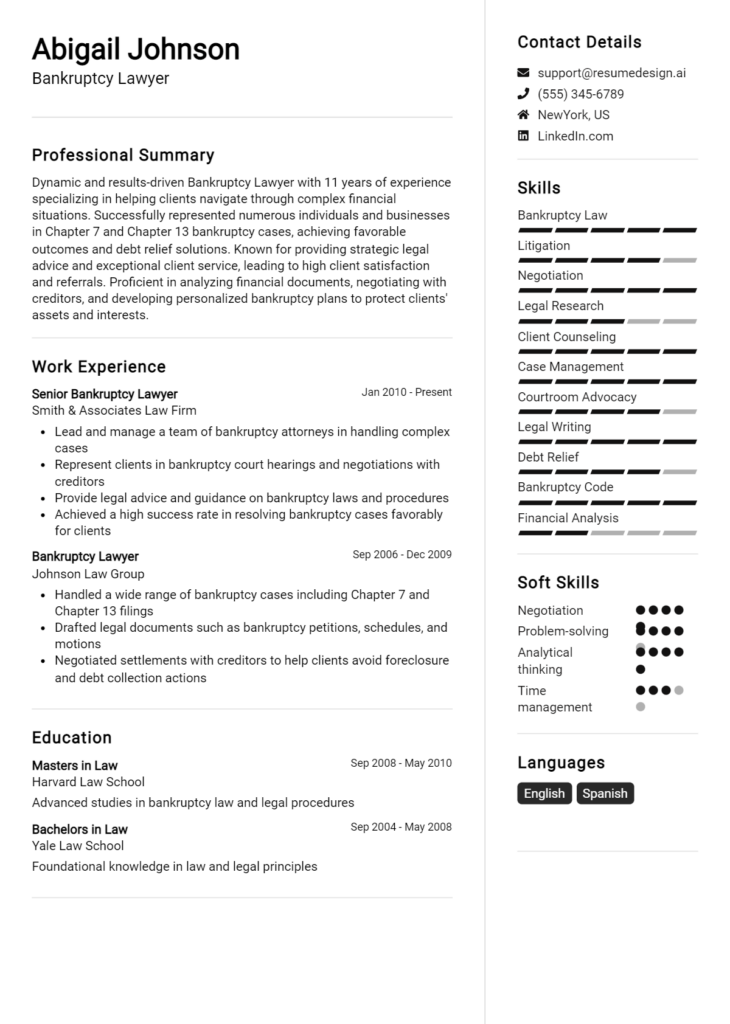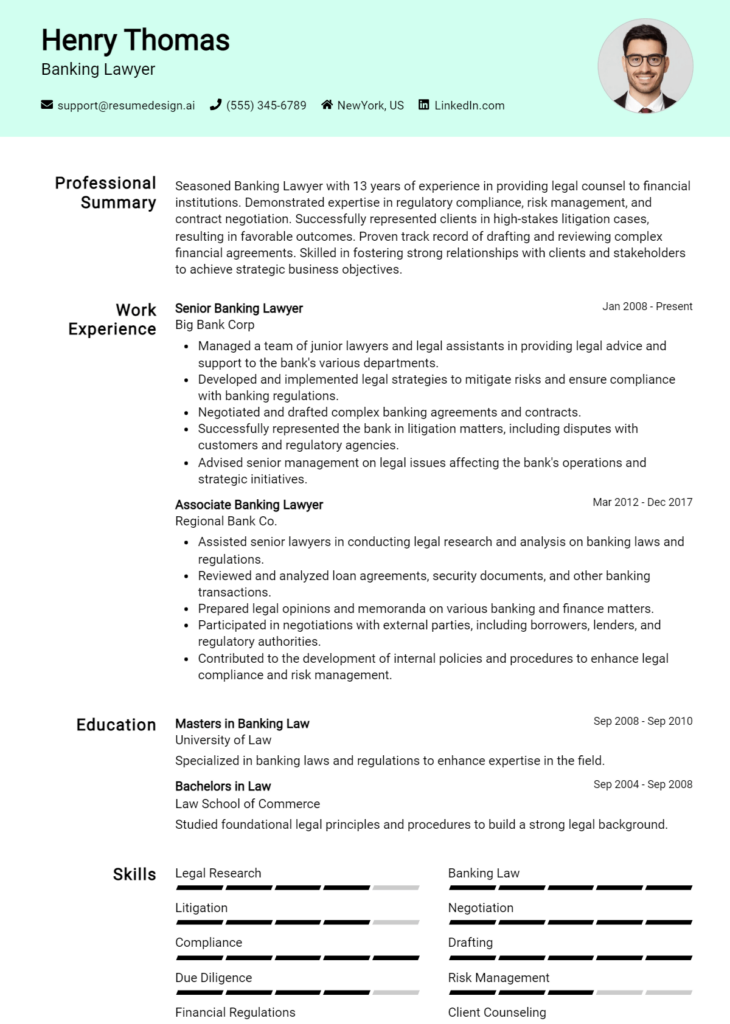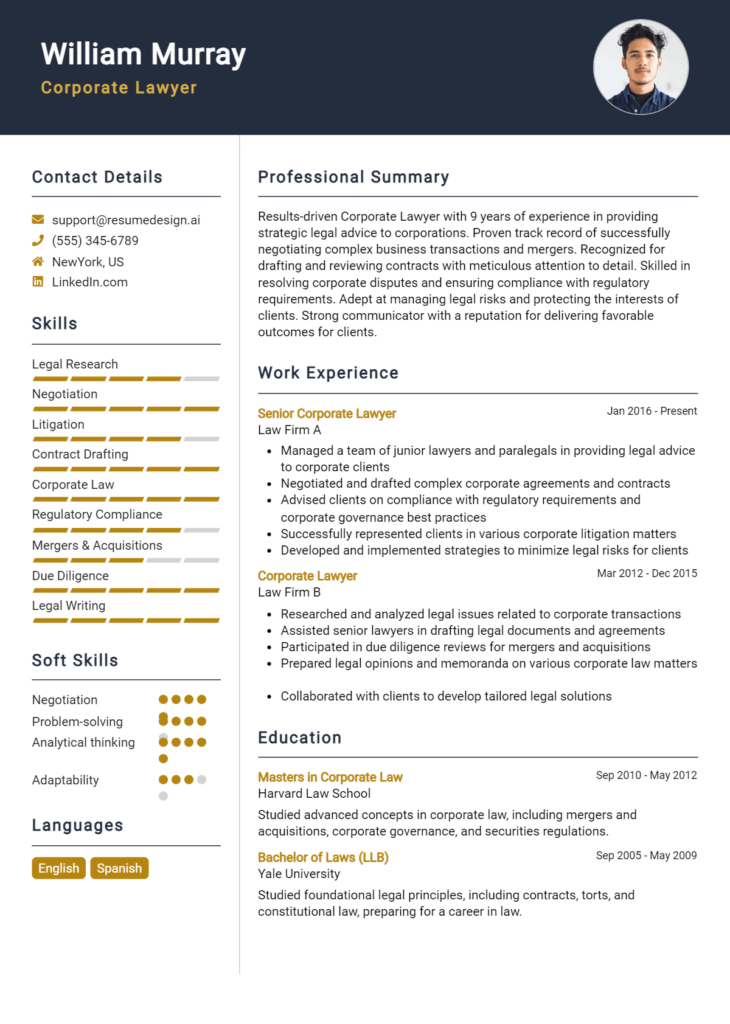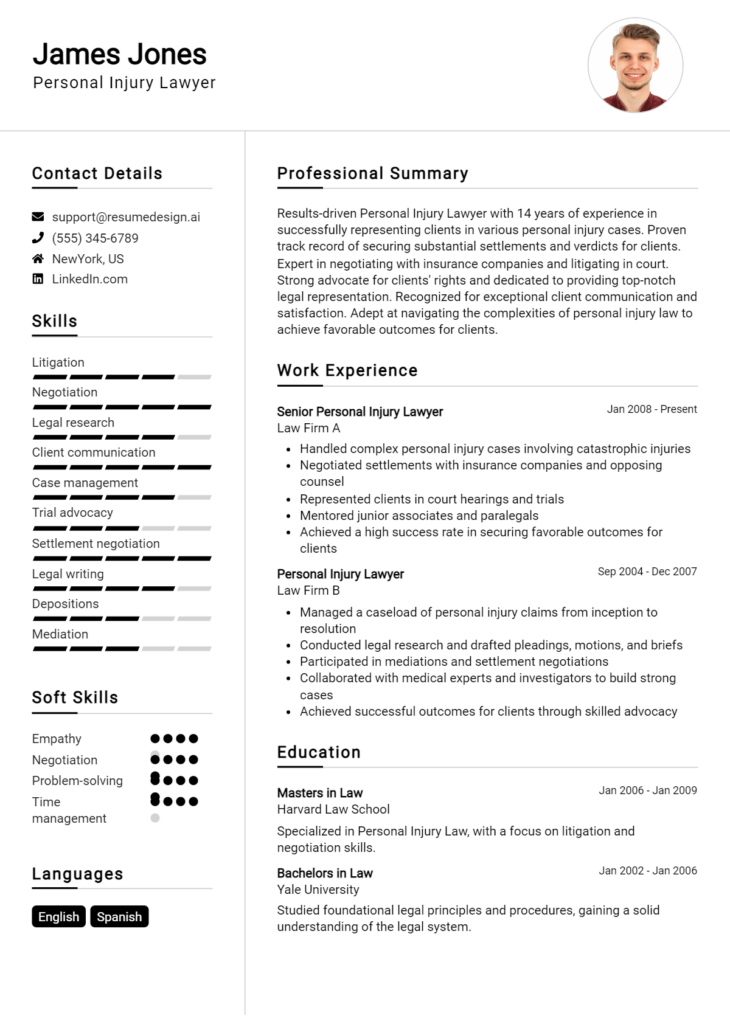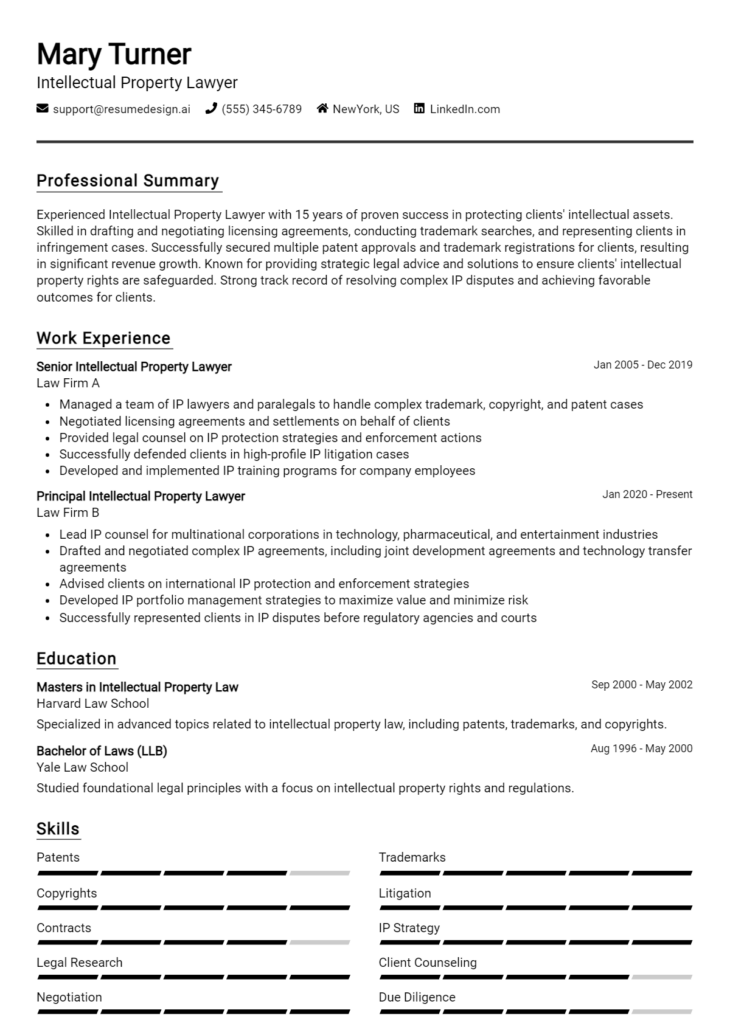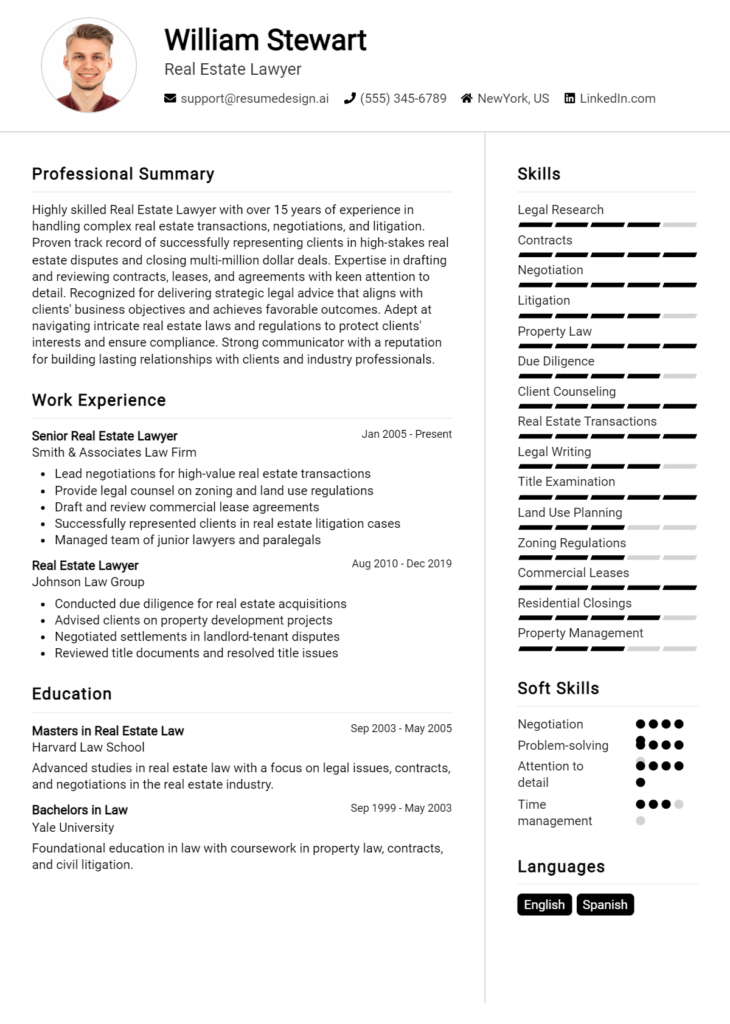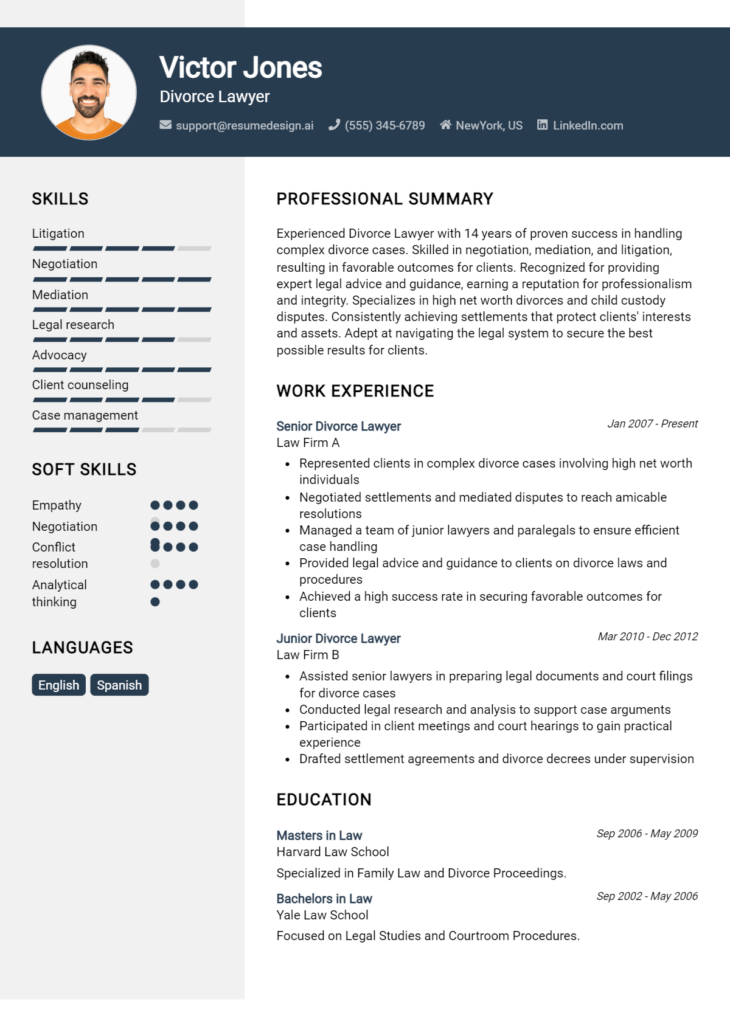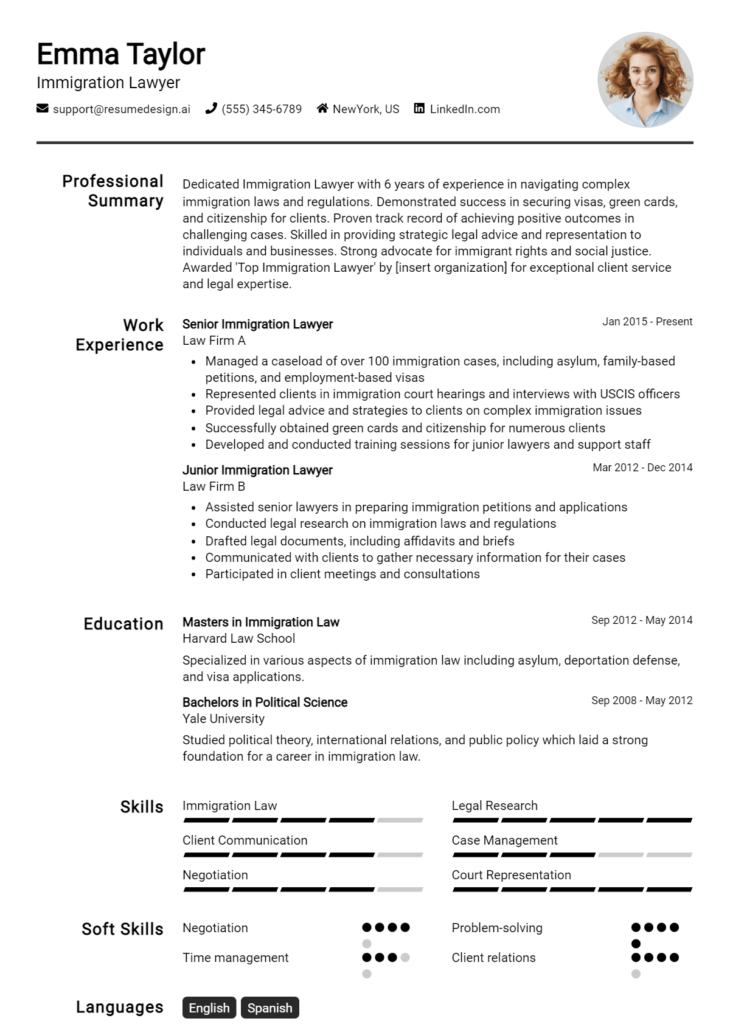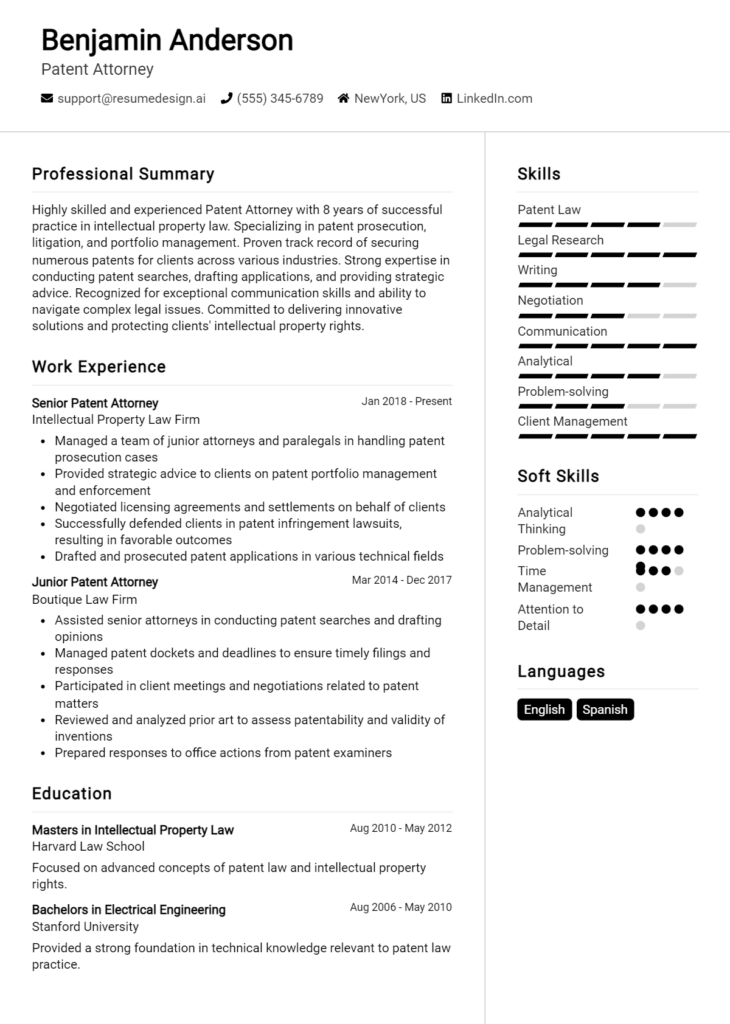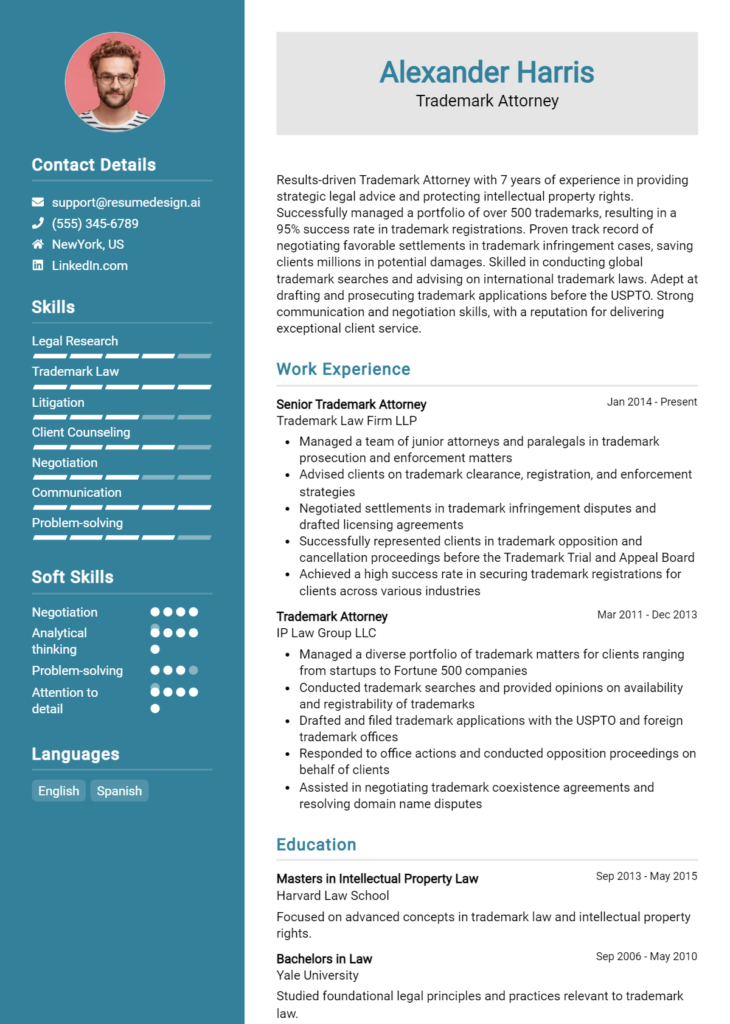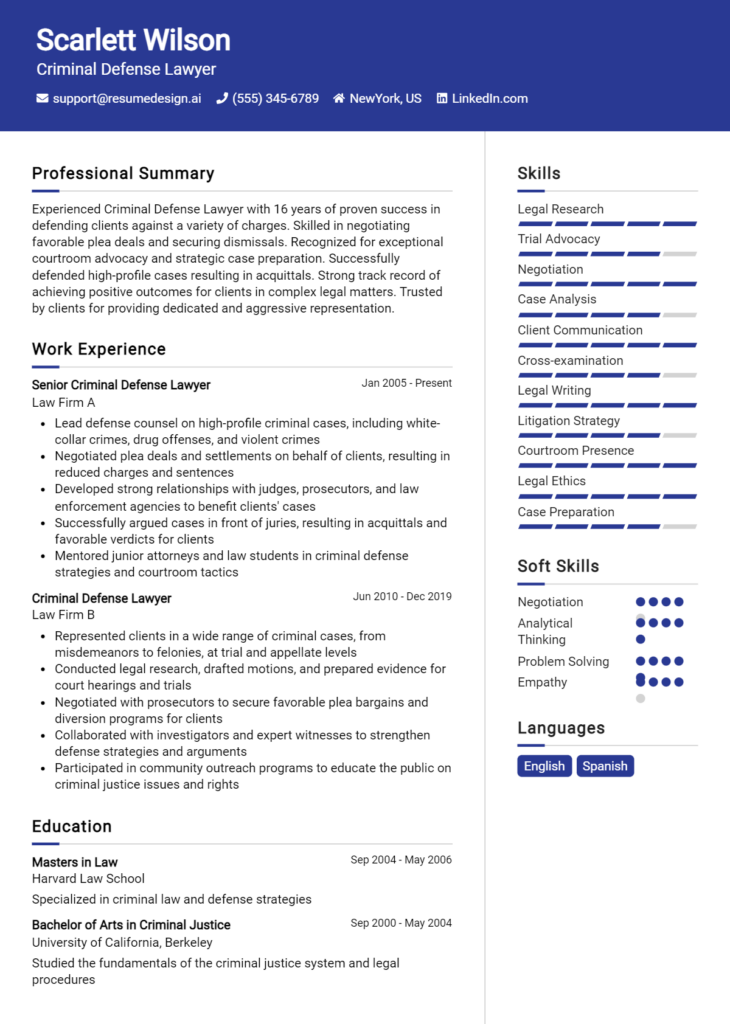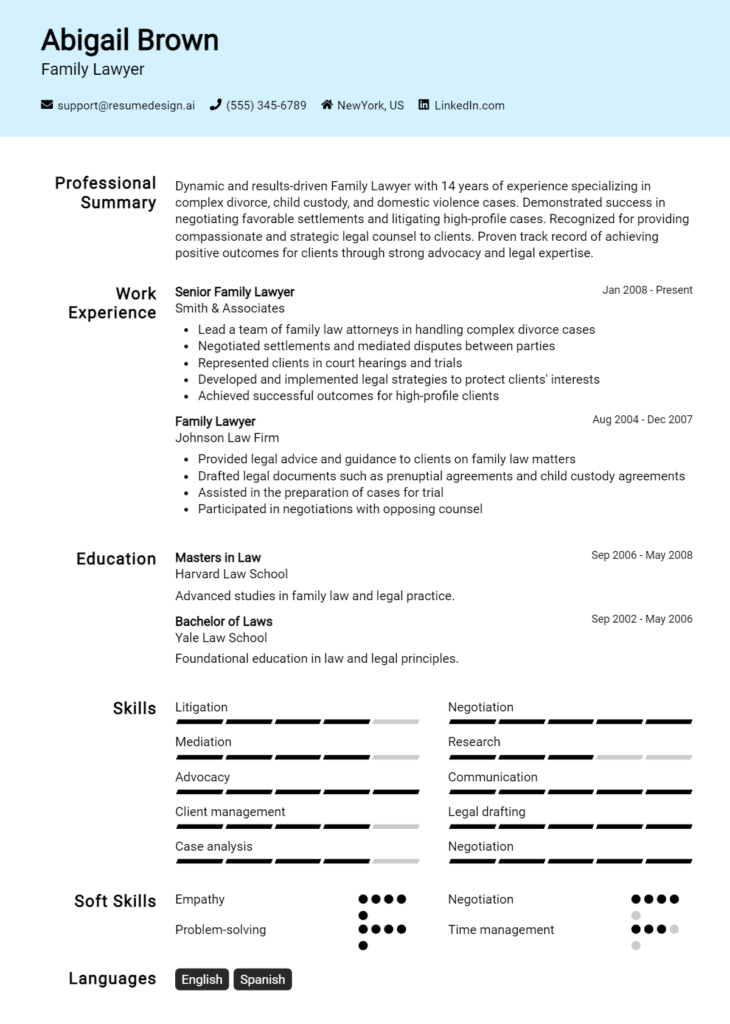Litigation Attorney Core Responsibilities
A Litigation Attorney plays a crucial role in representing clients in legal disputes, requiring a blend of technical, operational, and problem-solving skills. They collaborate with various departments, including compliance, finance, and human resources, to develop effective strategies for case management. Strong analytical abilities and attention to detail are essential for crafting compelling arguments and navigating complex legal frameworks. A well-structured resume that highlights these qualifications can significantly enhance career opportunities, aligning personal expertise with the organization’s objectives.
Common Responsibilities Listed on Litigation Attorney Resume
- Conduct legal research and analysis to support case strategies.
- Draft and review legal documents, including pleadings and motions.
- Represent clients in court hearings and trials.
- Negotiate settlements and facilitate dispute resolution.
- Prepare witnesses and manage trial preparation.
- Advise clients on legal rights and obligations.
- Collaborate with other legal professionals to ensure comprehensive case management.
- Maintain thorough documentation of case developments and communications.
- Stay updated on changes in laws and regulations affecting litigation.
- Develop case strategies based on thorough risk assessments.
- Engage in continuous legal education and professional development.
High-Level Resume Tips for Litigation Attorney Professionals
In the competitive field of litigation, a well-crafted resume is crucial for standing out among a sea of candidates. For litigation attorneys, this document often serves as the first impression made on potential employers, making it essential to present both skills and achievements in a compelling manner. A strong resume not only highlights a candidate's legal expertise but also showcases their ability to navigate complex cases and advocate effectively for clients. This guide will provide practical and actionable resume tips specifically tailored for litigation attorney professionals, ensuring that your application captures the attention of hiring managers.
Top Resume Tips for Litigation Attorney Professionals
- Tailor your resume to the job description: Align your skills and experience with the specific requirements of the position you are applying for.
- Showcase relevant experience: Highlight your experience in litigation, including the types of cases you’ve worked on and your specific role in those cases.
- Quantify achievements: Use metrics and specific outcomes to demonstrate your effectiveness, such as percentage of cases won or settlements achieved.
- Highlight industry-specific skills: Focus on skills that are particularly relevant to litigation, such as negotiation, legal research, and courtroom experience.
- Include certifications and licenses: Clearly list any bar admissions, certifications, or specialized training that enhance your qualifications as an attorney.
- Utilize a clear and professional format: Ensure your resume is easy to read, with clearly defined sections and a professional appearance.
- Incorporate keywords from the job posting: Use relevant legal terminology and keywords to help your resume pass through applicant tracking systems.
- Keep it concise: Aim for a one-page resume if you have less than ten years of experience, with a maximum of two pages for more extensive backgrounds.
- Include a strong summary statement: Write a compelling summary at the top of your resume that encapsulates your skills, experience, and career goals.
By implementing these tips, you can significantly enhance your chances of landing a job in the litigation attorney field. A polished and strategically crafted resume will not only showcase your qualifications but also convey your professionalism and readiness to take on the challenges of a legal career.
Why Resume Headlines & Titles are Important for Litigation Attorney
In the competitive field of law, a Litigation Attorney's resume serves as a critical tool for showcasing their qualifications and expertise. One of the most vital components of this document is the resume headline or title. A strong headline can immediately capture the attention of hiring managers by providing a succinct summary of a candidate's key qualifications in one impactful phrase. It should be concise, relevant, and directly related to the job being applied for, effectively setting the tone for the rest of the resume and enticing employers to delve deeper into the candidate's experience and skills.
Best Practices for Crafting Resume Headlines for Litigation Attorney
- Keep it concise: Aim for one powerful sentence that summarizes your qualifications.
- Be specific: Tailor your headline to reflect the specific litigation role you are applying for.
- Highlight key strengths: Focus on your most relevant skills or achievements.
- Use action words: Choose strong verbs to convey your proactive approach.
- Incorporate relevant keywords: Utilize industry-specific terms to enhance visibility.
- Showcase unique selling points: Highlight what sets you apart from other candidates.
- Avoid clichés: Steer clear of overused phrases that lack originality.
- Align with job description: Ensure your headline reflects the requirements outlined in the job posting.
Example Resume Headlines for Litigation Attorney
Strong Resume Headlines
"Results-Driven Litigation Attorney with 10+ Years of Experience in Complex Commercial Disputes"
“Skilled Litigation Advocate Specializing in Employment Law and Civil Rights Cases”
“Dynamic Litigation Counsel with Proven Track Record of Winning High-Stakes Trials”
Weak Resume Headlines
“Lawyer Looking for Opportunities”
“Experienced Professional”
The strong headlines are effective because they clearly communicate the candidate’s experience, focus, and unique strengths, making them memorable and relevant to hiring managers. They provide specific insights into the candidate's capabilities and align closely with the job requirements. In contrast, the weak headlines fail to impress due to their vagueness and lack of specificity, leaving hiring managers with little understanding of the candidate’s qualifications or potential contributions to the firm.
Writing an Exceptional Litigation Attorney Resume Summary
A well-crafted resume summary is crucial for a Litigation Attorney, as it serves as the first impression for hiring managers. This concise statement encapsulates the candidate's key skills, relevant experience, and notable accomplishments, immediately showcasing their qualifications for the role. A strong summary can quickly capture attention, setting the tone for the rest of the resume. It should be impactful, tailored to the specific job the candidate is applying for, and highlight the unique attributes that align with the employer's needs.
Best Practices for Writing a Litigation Attorney Resume Summary
- Quantify Achievements: Use numbers to illustrate your impact, such as the number of cases won or settlements achieved.
- Focus on Relevant Skills: Highlight specific legal skills relevant to litigation, such as negotiation, trial preparation, and legal research.
- Tailor the Summary: Customize the summary for each job application to align with the job description and company values.
- Use Strong Action Verbs: Start sentences with powerful verbs like "achieved," "negotiated," or "represented" to convey confidence.
- Keep it Concise: Aim for 3-5 sentences that deliver a clear and impactful message without unnecessary fluff.
- Showcase Unique Qualifications: Include any certifications, specializations, or unique experiences that differentiate you from other candidates.
- Maintain Professional Tone: Use formal language appropriate for the legal field while ensuring clarity and readability.
- Highlight Outcomes: Mention the results of your work, such as successful verdicts or improved client satisfaction ratings.
Example Litigation Attorney Resume Summaries
Strong Resume Summaries
Results-driven Litigation Attorney with over 7 years of experience in civil litigation, achieving a 90% success rate in trial outcomes. Adept at negotiating settlements that have saved clients over $2 million in potential damages.
Dynamic Litigation Specialist with a proven track record of managing over 100 cases from inception to resolution. Skilled in legal research and persuasive argumentation, leading to a 30% increase in successful verdicts in high-stakes lawsuits.
Dedicated Attorney with extensive experience in corporate litigation, having represented Fortune 500 companies in complex lawsuits. Successfully reduced litigation costs by 25% through strategic case management and early settlement negotiations.
Weak Resume Summaries
Litigation Attorney with experience in various legal matters and a strong work ethic.
Experienced lawyer looking for a position in litigation where I can use my skills to help clients.
The examples of strong resume summaries are considered effective because they provide specific, quantifiable achievements and relevant skills that directly relate to the litigation attorney role. They demonstrate the candidate's impact and expertise in a concrete manner. In contrast, the weak summaries lack detail, specificity, and measurable outcomes, making them generic and less appealing to hiring managers.
Work Experience Section for Litigation Attorney Resume
The work experience section of a Litigation Attorney resume is crucial as it not only highlights the candidate's technical skills and legal expertise but also showcases their ability to manage teams and deliver high-quality legal products. This section allows potential employers to assess how well a candidate aligns with industry standards and their capacity to produce quantifiable results. By emphasizing specific achievements and measurable outcomes, candidates can effectively differentiate themselves in a competitive job market, demonstrating their value to potential employers.
Best Practices for Litigation Attorney Work Experience
- Use clear, concise language to describe your roles and responsibilities.
- Focus on quantifiable achievements, such as win rates, settlement amounts, or case efficiencies.
- Highlight technical skills relevant to litigation, such as proficiency in legal research tools or case management software.
- Emphasize your role in managing teams and collaborating with colleagues or clients.
- Align your experience with industry standards and expectations to showcase your knowledge of the field.
- Include relevant keywords from the job description to enhance visibility in applicant tracking systems.
- Prioritize recent and relevant experiences to keep your resume current and impactful.
- Tailor your work experience to reflect the specific requirements of each job application.
Example Work Experiences for Litigation Attorney
Strong Experiences
- Successfully led a team of five attorneys in a multi-million dollar wrongful termination case, achieving a 90% success rate in trial outcomes.
- Negotiated settlements totaling over $3 million for clients in commercial litigation, improving client satisfaction scores by 30%.
- Implemented a new case management system that reduced document retrieval time by 40%, enhancing overall team efficiency.
- Coordinated with experts and external counsel on complex litigation matters, resulting in a streamlined case strategy that shortened trial preparation time by two months.
Weak Experiences
- Worked on various legal cases with little detail on outcomes or responsibilities.
- Assisted in preparing documents without specifying the types or significance of the documents.
- Participated in team meetings but did not clarify the impact of these meetings on case progress.
- Involved in litigation cases without providing quantifiable results or achievements.
The examples listed as strong experiences are considered effective because they provide specific, quantifiable outcomes and demonstrate leadership and collaboration in meaningful ways. In contrast, the weak experiences lack detail and measurable achievements, making it difficult for potential employers to assess the candidate's contributions and effectiveness in their roles. Strong examples illustrate a clear impact on the organization and its clients, while weak examples fail to convey the candidate's value or expertise.
Education and Certifications Section for Litigation Attorney Resume
The education and certifications section of a Litigation Attorney resume is crucial as it showcases the candidate's academic background and professional qualifications that are essential for success in the legal field. This section not only highlights degrees obtained from accredited law schools but also emphasizes industry-relevant certifications and ongoing education efforts. By including pertinent coursework, specialized training, and certifications, candidates can enhance their credibility, demonstrate their commitment to continuous learning, and align themselves more closely with the job requirements, ultimately making a compelling case for their candidacy.
Best Practices for Litigation Attorney Education and Certifications
- Include your Juris Doctor (JD) degree from an accredited law school, as this is fundamental for a litigation attorney.
- List any relevant certifications, such as Certified Litigation Specialist or other specialized legal designations.
- Provide details about relevant coursework that pertains to litigation, trial practice, or dispute resolution.
- Highlight any continuing legal education (CLE) credits earned, particularly those related to litigation or trial advocacy.
- Use clear and concise formatting to make the education and certifications section easy to read.
- Rank the information in order of relevance, placing the most pertinent qualifications at the top.
- Include dates of graduation, certifications, and any other time-sensitive information to show recent qualifications.
- Consider mentioning any honors or awards received during your academic career that relate to litigation or legal advocacy.
Example Education and Certifications for Litigation Attorney
Strong Examples
- Juris Doctor, Harvard Law School, Graduated Cum Laude, 2020
- Certified Litigation Specialist, National Board of Trial Advocacy, 2021
- Relevant Coursework: Advanced Civil Procedure, Trial Practice, and Evidence
- Continuing Legal Education (CLE): 20 hours in Trial Advocacy, 2023
Weak Examples
- Bachelor of Arts in History, State University, 2010 (not directly relevant to litigation)
- Certification in Basic Mediation, 2015 (not specialized for litigation)
- Coursework: Introduction to Psychology (not related to legal practice)
- Completed outdated CLE on Real Estate Law, 2018 (not relevant to current litigation focus)
The strong examples provided are considered effective because they directly align with the qualifications and skills necessary for a Litigation Attorney, showcasing advanced degrees, relevant certifications, and specialized coursework that demonstrates a commitment to the field. In contrast, the weak examples are less effective as they include irrelevant or outdated qualifications that do not contribute to the candidate's ability to perform in a litigation-focused role, demonstrating a lack of focus on necessary legal expertise.
Stand Out with a Winning Litigation Attorney Cover Letter
I am writing to express my interest in the Litigation Attorney position at [Company Name] as advertised on [Job Board/Company Website]. With over [X years] of experience in civil litigation, I have developed a robust skill set that enables me to manage complex cases effectively and advocate for my clients with zeal. My background includes extensive courtroom experience, where I have successfully represented clients in various disputes, including contract and employment litigation, product liability, and personal injury cases. I am eager to bring my expertise and passion for legal advocacy to your esteemed firm.
At my previous position with [Previous Firm Name], I was responsible for overseeing a diverse caseload while collaborating closely with clients to understand their unique needs and objectives. I have a proven track record of conducting thorough legal research, drafting persuasive motions, and employing strategic negotiation tactics that have consistently led to favorable outcomes. My commitment to maintaining high ethical standards and fostering open communication has been instrumental in building strong client relationships and ensuring their interests are always prioritized.
What sets me apart as a litigation attorney is my ability to remain calm under pressure and my relentless pursuit of justice. I thrive in high-stakes environments, and my proactive approach allows me to anticipate challenges and devise effective solutions swiftly. I believe that my dedication to continuous learning and professional growth aligns well with [Company Name]'s values, and I am excited about the opportunity to contribute to your team's success.
Thank you for considering my application. I am looking forward to the possibility of discussing how my legal expertise and passion for litigation can benefit [Company Name]. I am eager to bring my skills in litigation and my commitment to achieving excellent results for clients to your esteemed firm. Please feel free to contact me at [Your Phone Number] or [Your Email Address] to schedule a conversation.
Common Mistakes to Avoid in a Litigation Attorney Resume
When crafting a resume for a Litigation Attorney position, it’s essential to present a polished and professional document that highlights your skills and experience effectively. However, many candidates make common mistakes that can detract from their qualifications and diminish their chances of securing an interview. Below are some of the most frequent pitfalls to avoid in your resume:
Using a Generic Template: Many applicants use one-size-fits-all templates that don’t reflect their unique qualifications. Tailoring your resume to the specific job and showcasing relevant experience is key.
Failing to Highlight Relevant Experience: It’s crucial to emphasize experience directly related to litigation, such as courtroom appearances, case management, and trial preparation. Omitting this information can suggest a lack of experience.
Overloading with Legal Jargon: While legal terminology is important, overusing it can make your resume difficult to read. Aim for clarity and conciseness to ensure that your achievements are easily understood.
Neglecting Soft Skills: Litigation attorneys require strong communication, negotiation, and interpersonal skills. Failing to mention these qualities can leave your resume feeling incomplete.
Listing Responsibilities Instead of Achievements: Simply stating what you did in previous roles doesn’t showcase your impact. Focus on quantifiable achievements that demonstrate your effectiveness, such as successful case outcomes or client satisfaction.
Ignoring Formatting and Consistency: A cluttered or inconsistent format can distract from your qualifications. Ensure that your resume is clean, professional, and follows a consistent style throughout.
Omitting Continuing Education and Certifications: Staying current with legal education and certifications is imperative in the legal field. Failing to mention these credentials can make you appear less committed to professional development.
Including Irrelevant Information: Personal details or unrelated work experience can dilute the impact of your resume. Keep your content focused on your legal expertise and relevant experiences to make a stronger impression.
Conclusion
As a Litigation Attorney, your resume is your first opportunity to make a strong impression on potential employers. Throughout this article, we have emphasized the importance of highlighting your legal expertise, courtroom experience, and negotiation skills. We also discussed the significance of tailoring your resume to specific job descriptions and showcasing your achievements with quantifiable results.
In addition to the core competencies, including relevant certifications and memberships in legal associations can greatly enhance your profile. Remember, a well-organized and professional presentation of your qualifications can set you apart from the competition.
Now is the perfect time to take a closer look at your Litigation Attorney resume. Ensure it reflects your skills and experience accurately and persuasively. To assist you in this process, consider utilizing the following resources:
- Explore a variety of resume templates that can help you structure your information effectively.
- Use the resume builder to create a professional resume that stands out.
- Review resume examples for inspiration on how to present your achievements.
- Don’t forget the value of a compelling cover letter; check out our cover letter templates for guidance.
Take action today to refine your Litigation Attorney resume and enhance your chances of landing your next position. Your dream job in the legal field is within reach!

